Bulletin for March 23, 2025
Download Sunday’s BulletinChrist the Priest
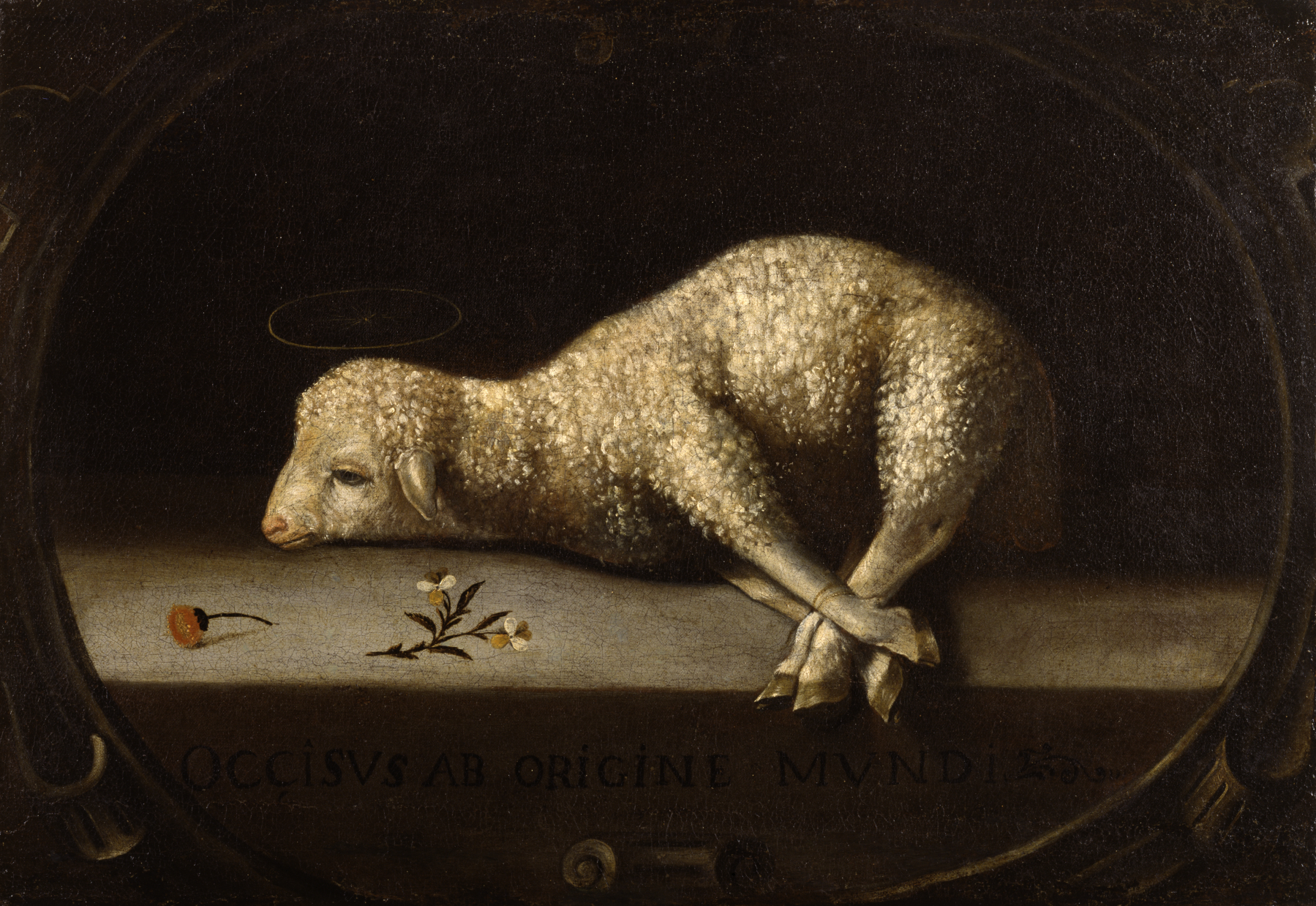
Christ’s prophetic office is primarily about how God communicates with us. But it’s one thing for God to speak to us and another thing entirely for us to speak to God. In order to do that, we need a mediator; we need a priest. A priest stands before God on behalf of the people. The priest is the way that the people can interact with God.
We’ve already spoken about how Christ is the only Redeemer of God’s elect, and when we come to his priesthood, we’re talking about how he redeems us. So how is it that we can approach God?
Q. 25. How doth Christ execute the office of a priest?
A. Christ executeth the office of a priest, in his once offering up of himself a sacrifice to satisfy divine justice, and reconcile us to God; and in making continual intercession for us.
Notice that the catechism gives two ways that Christ executes the office of a priest. First, he executes the office of a priest in his once offering up of himself a sacrifice. We know, of course, that this was what Christ was doing on the cross, and truly in all his sufferings. He was doing the ultimate priestly work of giving his own life for the people. All other priests offer up other sacrifices, but Christ gave his own life as a sacrifice for sins. He is himself the lamb brought to slaughter (Isaiah 53:7).
This achieved a twofold redemption. First, Christ’s sacrifice satisfied divine justice. The word we often use for this is propitiation. A propitiation is a kind of covering. In this case, Christ is our covering from the wrath of God, a shield against righteous judgment and a protection against God’s holiness. He is able to make this satisfaction because “he has borne our griefs and carried our sorrows” (Isaiah 53:4). Isaiah goes on:
But he was pierced for our transgressions; he was crushed for our iniquities; upon him was the chastisement that brought us peace, and with his wounds we are healed.
And in satisfying God’s justice, Christ’s sacrifice also reconciles us to God (Romans 5:10-11, 2 Corinthians 5:18, Colossians 1:21-22). The word we often use for this is atonement. This was a word invented by William Tyndale when he translated the Bible, and it means what it says: at-one-ment. Christ’s sacrifice makes the elect one with God, bringing us together into his fellowship through Christ’s death.
But while Christ’s death was once for all, his work is not finished. The second way he executes the office of a priest is in his continual intercession for us (Romans 8:34, Hebrews 7:25). To intercede is to stand on someone’s behalf. Christ is now, at the right hand of the Father, pleading our case before him. When you sin and ask forgiveness, Jesus Christ himself takes your prayer and lifts it up to the Father. He does the same with all of our requests. This is why we pray in the name of Jesus, because whenever you pray, you do not pray alone, but you have a prayer partner.
How would we pray if we knew that Jesus was always standing beside us, praying alongside us, perfecting our prayers to receive a blessed response? Whether we realize it or not, this is exactly what’s happening. The Lamb who died for your sins has risen again for the express purpose of bringing you to God, of bringing your desires and petitions to him. So when you pray, remember your priestly prayer partner. Trust in him, in his sacrifice that brought justice and reconciliation, and in his prayers which always arise for you to his Father.
Updates
Don’t forget about our congregational meeting, next week, March 30th, immediately following the worship service!
Your friend in Christ,
Reid
Bulletin for March 16, 2025
Download Sunday’s BulletinChrist the Prophet
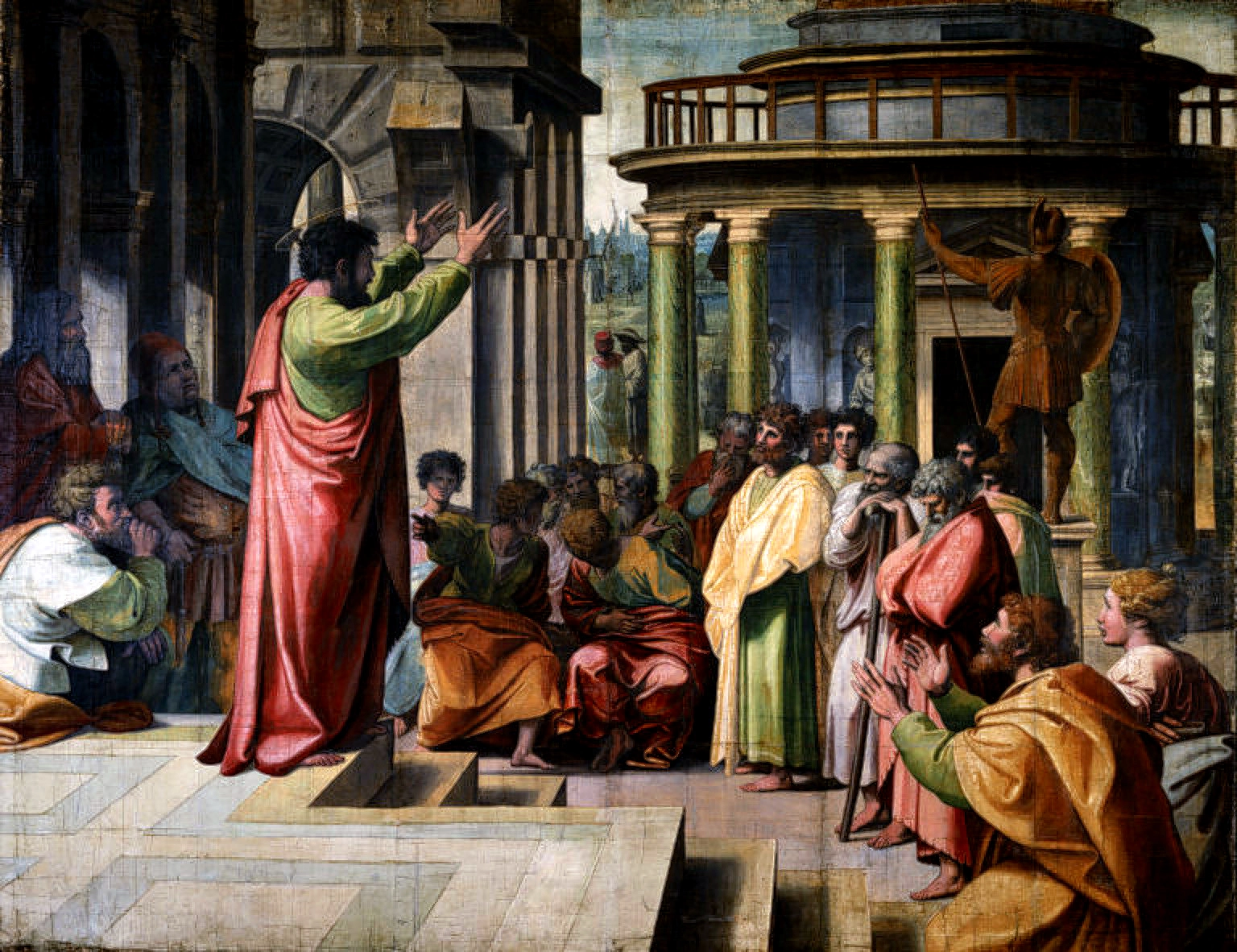
Paul preaching in Athens
The next question of the catechism sets up the rest of the section on Christ.
Q. 23. What offices doth Christ execute as our redeemer?
A. Christ, as our redeemer, executeth the offices of a prophet, of a priest, and of a king, both in his estate of humiliation and exaltation.
So Christ has three offices and two estates. The next questions deal with these five things. This week, we begin with Christ’s prophetic office.
Q. 24. How doth Christ execute the office of a prophet?
A. Christ executeth the office of a prophet, in revealing to us, by his word and Spirit, the will of God for our salvation.
Moses, of course, is one of the most important people in all the Bible, and his primary role was to speak God’s Word to the people. He was a prophet. But when we get to Deuteronomy, there’s a problem: Moses is about to die, and Israel’s access to new revelation from God will be limited. It’s in that context that we get this prophecy:
I will raise up for them a prophet like you from among their brothers. And I will put my words in his mouth, and he shall speak to them all that I command him. (Deuteronomy 18:18)
In Acts 3, Peter tells us explicitly that this prophet is Jesus Christ. With the advent of the prophet Jesus, there are no more prophets like the days of old. He is the last prophet, and he appointed his apostles to write down his teaching and close the canon of Scripture. Hebrews 1:1-2 reminds us of this:
Long ago, at many times and in many ways, God spoke to our fathers by the prophets, but in these last days he has spoken to us by his Son, whom he appointed the heir of all things, through whom also he created the world.
But what does it mean that Jesus is a prophet? It means that he is the person through whom God speaks. First, he speaks by his Word. In Luke 4, Jesus says that he was appointed to preach the gospel and to proclaim the Lord’s favor (Luke 4:18-19). In Matthew, he is presented as a new and better Moses as he stands on the mountain and preaches and interprets the Law to the people of Israel (Matthew 5-7). Second, he speaks through his Spirit. He promised to his disciples that the Spirit of God would come to testify and bear witness to the truth (John 15:26-27). He is the only mediator of God’s elect who brings the truth of God to his people, and the truth that he brings is the gospel, that he is the way, the truth, and the life, that no one comes to the Father except through him.
But how does Christ now execute that office since he is ascended? The answer is the same that he himself gave: by his Word and Spirit. In the Word of God, we have Jesus’ words. We, of course, have the red letters in the Gospels, but since Jesus is God, we find that he is actually the author behind all of Scripture. Every word of every prophet is the word of Jesus, so we’re called to hear him in Scripture as it has been handed down to us. By the power of his Spirit, Jesus reveals the Word to us. The Spirit provides illumination to the believer so that he not only hears the words of Jesus, but understands them and is changed by them.
The prime way this happens is in the public preaching of the Word. Through his appointed servants, the Prophet still speaks. In fact, one old way of referring to preaching is to call it prophesying. It’s not that the preacher has new revelation to give, but his prophetic ministry is to repeat the words of Christ to the Bride of Christ. This is the preacher’s call and commission.
So do you want to hear Jesus speak prophetically to you? Open your ears to the preaching of the Word in the Lord’s Day assembly. Listen as the minister reads the Word of God to you. Read the Word to your family and in your private worship. And pray that in all these things, the Spirit would guide you into sanctification and deeper fellowship with your Savior Prophet.
Psalm 3
I meant to share this last week, but here’s a recording of the psalm we’re singing over the next few weeks. Make not of the word “de-li-ver-ance” (4 syllables) in the last verse!
Updates
A congregational meeting is scheduled for March 30, 2025. We’ll meet immediately following the worship service to vote on a new rotational system for officers and elect new elders.
Your friend in Christ,
Reid
Bulletin for March 9, 2025
Download Sunday’s BulletinUpdates
Two major things to keep in mind:
-
This weekend, Rev. Ron Horgan will be with us for an evangelism training. We’ll meet at 9 AM on Saturday, tomorrow morning, with lunch to follow. Ron will also be preaching at our Lord’s Day service.
-
It’s time change Sunday! Be sure to set your clocks forward an hour, and drink an extra cup of coffee before church!
Your friend in Christ,
Reid
Bulletin for March 2, 2025
Download Sunday’s BulletinGod with Us and Like Us
In the last question, we learned that the Redeemer of God’s elect is Jesus Christ who is both God and man. Most Christians are used to this idea, but it’s not so simple as it first seems. This is actually one of the deepest questions of the Christian faith. In fact, what we believe about this is one of the things that makes us Christian (as opposed to some other religion). So the Catechism gives us a little help in wrapping our minds around this.
Q. 22. How did Christ, being the Son of God, become man?
A. Christ, the Son of God, became man, by taking to himself a true body and a reasonable soul, being conceived by the power of the Holy Ghost in the womb of the virgin Mary, and born of her, yet without sin.
The answer to this question divides into two parts. First, the Catechism talks about the ways that Christ is like us; in particular, it reminds us that Christ took to himself (1) a true body and (2) a reasonable soul. The body part is pretty easy for us to wrap our heads around. We know that Christ took on flesh and blood. The fullness of deity dwells in him bodily (Colossians 2:9). Is a human body a complete human? No! The body is only one part of us, we also have souls; therefore, in order to take on a full human nature, Christ must have a human soul as well.1 This is what Paul means when he says that Christ took on the “form” of a servant (Philippians 2:7). The word “form” is an extremely important word, but without getting into all the details, it’s sufficient to note that the form Paul is talking about is a human soul.
So Christ took on a body and soul just like ours, but he didn’t receive that body and soul like we do in the normal processes of human reproduction. Instead, his becoming man was miraculous. We are conceived through the union of man and woman, but it is through this normal course of life that Adam’s sin is imputed to us. This is, of course, why Jesus had to be born of a virgin. Christ, in order to maintain his perfection, couldn’t be born in the natural way.
Instead, he was conceived by the power of the Holy Spirit (Luke 1:35). As an aside, this fact is an evidence of the divine personhood of the Spirit: God is the only Creator, and the Spirit engages in creation ex nihilo, out of nothing, by creating a child in Mary’s womb. This miraculous birth, on one hand, protects Christ’s human nature from the stain of original sin, but it also makes a way for us to be freed from sin as well. Christ’s birth by the Holy Spirit is a reminder to us of our need to be reborn. When we are born again, we are born, “not of blood nor of the will of man, but of God” (John 1:13). We are born of water and the Spirit (John 3:5).
So Christ’s becoming man achieves two big things for Christians. First, the fact that he takes on a human nature means that he is able to be our Redeemer who redeems our fallen nature. And second, his manner of birth, by the power of the Holy Spirit, is the model for our manner of regeneration by the power of the Holy Spirit.
Updates
Next week, we have two special events coming up:
-
First, we’ll have an Ash Wednesday Service at 6 PM on March 5. Just as last year, there will not be an imposition of ashes. You can find the explanation here.
-
Then, on Saturday at 9 AM, Rev. Ron Horgan will be joining us to give an evangelism seminar with lunch to follow. Ron will also be preaching on Sunday.
Your friend in Christ,
Reid
-
The term “reasonable soul” is actually Medieval scholastic way of thinking, borrowing from older philosophical categories. Generally, theologians and philosophers have understood there to be three kinds of souls: vegetative (the kind plants have), animal (the kind animals have), and reasonable or rational (the kind humans and angels have). So when the Catechism refers to a “reasonable soul,” it’s drawing on this distinction. In other words, Christ has the same kind of soul that we have. ↩︎
Bulletin for February 23, 2025
Download Sunday’s BulletinEternal God, Eternal Man
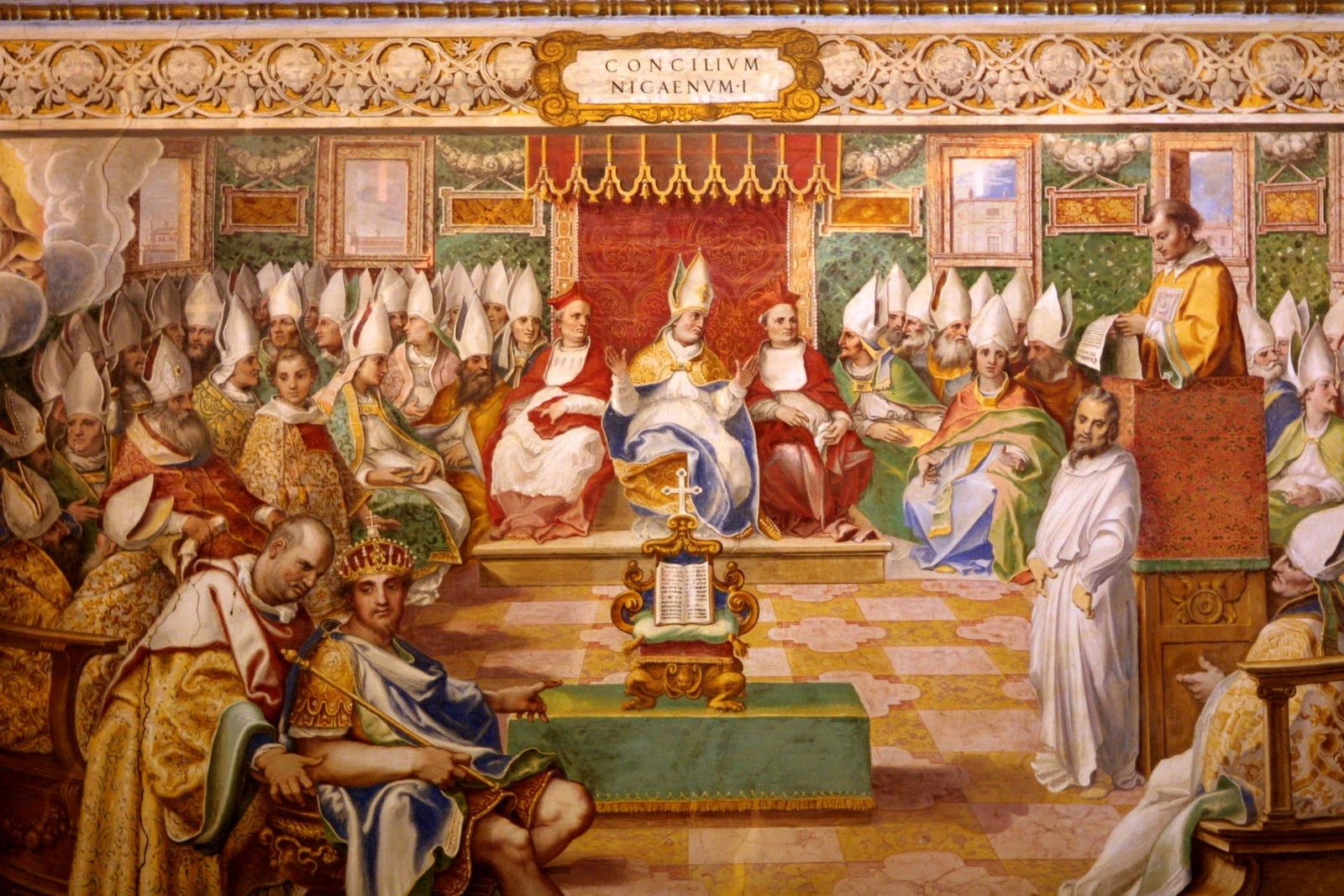
The First Council of Nicaea in session before Constantine
We’re back at the Shorter Catechism this week! We left off at question 20 which provided an answer to the problem of sin. That question reminds us that God did not leave mankind to perish, but provided a covenant of grace to bring the elect into an estate of salvation by a redeemer. The natural question then follows:
Q. 21. Who is the redeemer of God’s elect?
A. The only redeemer of God’s elect is the Lord Jesus Christ, who, being the eternal Son of God, became man, and so was, and continueth to be, God and man in two distinct natures, and one person, forever.
This is the first question of a series of questions about Christology, i.e., the study of Christ. This question is primarily concerned with the hypostatic union. This is a theology term used to describe the union of Christ’s two natures, one divine and one human, in the person (in Greek, the hypostatis) of the Son. This is an extremely important doctrine for Christians. In fact, a proper understanding is necessary for the gospel.
In the early centuries of the church, the doctrine of Christ was the primary place where error and heresy crept in. Even in the New Testament, we see the heresy of docetism, which is the idea that Christ did not have a real human body, but was merely a spirit. The next major error was Arianism, which holds that the Son is not the same essence as the Father. They even a wrote a popular hymn with the line “there was a time when the Son was not!” This error was addressed by the Council of Nicaea in their Creed which says the Son is “God of God, Light of Light, very God of very God; begotten, not made, being of one substance with the Father…” There were other errors as well, but they all fall into one of two ditches. On one hand, there’s a tendency to make Christ less than human (as in docetism). The other tendency is to make Christ less than God (as in Arianism). But orthodox, biblical Christianity holds that Christ is fully God and fully man.
This doctrine is extremely clear in the Bible. First, Jesus is God. Isaiah 9:6, a prophecy about Jesus, says that he is the “almighty God.” This is repeated in the gospels. His name is Emmanuel, God with us (Matthew 1:23), and he is the eternal Word who was with the Father in eternity (John 1:14). He is named as the Creator of the world (Colossians 1:16, John 1:3). His eternal sonship is attested throughout the gospels (Matthew 3:7, 17:5; John 1:18), and even in the Old Testament (Psalm 2:7).
Second, Jesus is man. He lived a fully human life, eating and drinking, sleeping and resting. And, of course, he even died a full human death on the cross, and a full human burial in the tomb. But he is also still a man, even now. In his Resurrection, although his body is glorifies, he still bears the marks of his suffering and death. And Acts 1:11 tells us that “this same Jesus” will return, not merely in spirit, but bodily.
But why? Why must Jesus be fully God and fully man? Because this is necessary for Jesus to be our Redeemer and Mediator! There is one God, and one mediator between God and man, the man Jesus Christ (1 Timothy 2:5-6). Fallen man cannot approach God to speak on his behalf, so God’s representative must be God himself. And God cannot redeem without justice, and that justice had to be poured out on a man. Jesus Christ meets both of these problems: he was and continues to be God and man in two distinct nature and one person forever.
Updates
-
Our Ash Wednesday service will be Wednesday, March 5, at 6 PM. Choir will not meet.
-
Rev. Ron Horgan will be with us on March 8th for an evangelism seminar. We’ll meet at 9 AM with lunch to follow.
Your friend in Christ,
Reid
Bulletin for February 16, 2025
Download Sunday’s BulletinTabernacle as New Creation
As we’ve been working through the tabernacle instructions over the last few weeks, I’ve mentioned several times that the construction of the tabernacle mirrors the days of creation. That’s harder to see when you’re going through slowly like we have, so I thought it would be helpful to see a chart.
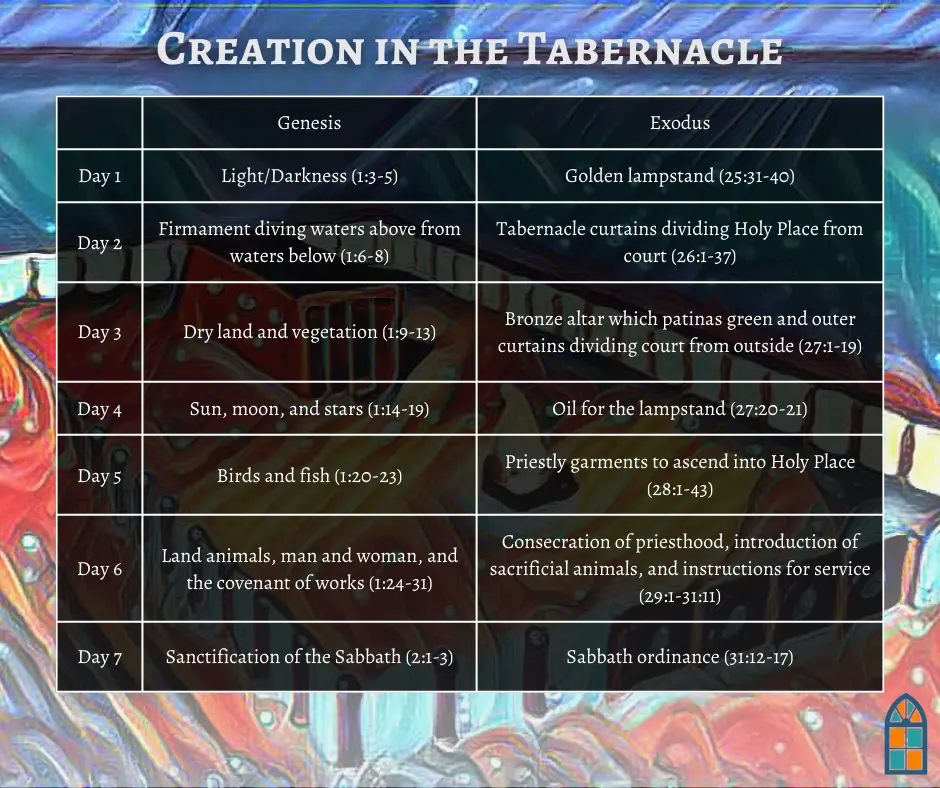
This chart is a rough sketch, and some have drawn the lines in slightly different places. But the general structure is present. You may also remember that the days of creation are divided into two sets of three. The earth was “formless and void,” so when God set about creation, he spent three days on forming and three days on filling. In other words, before he made stars for the sky, fish for the sea, or animals for the land, he had to make the sky, the sea, and the land. That structure is also clearly present in the tabernacle. The first half of the instructions are all about building the places to put things, and the second half are about the things to put in those places.
This structure is important because what’s happening in Exodus is a mirror of Genesis. The tabernacle’s new creation imagery puts us in a Genesis frame of mind. But if you know anything about the creation, you know that the fall comes next. This Sunday, that’s what we’ll be talking about. After God brought Israel this new creation in the tabernacle, the first thing they do is fall into sin with the golden calf, just as Adam and Eve fell into sin at the tree of the knowledge of good and evil. But more on that Sunday.
If this interests you, and you want to hear more, I recommend Alistair Roberts’ Biblical Reflections. Dr. Roberts has recorded a short reflection on every book of the Bible, and they are very helpful. He teases this theme out in his reflections on Exodus 25-31.
Updates
-
Remember that we have the Lord’s Supper this week! Be preparing your hearts as the Lord’s Day approaches. If you’d like some resources on preparation, as always, I suggest reflecting on Larger Catechism 171.
-
On Wednesday, March 5, we’ll have our annual Ash Wednesday service.
-
Then, on March 8th from 9AM to 12PM, Rev. Ron Horgan, our presbytery church health coordinator, will be with us to give an evangelism seminar. Many of you already have the book he passed out last time he was with us, and I encourage you to read through that book beforehand if you haven’t already. If you don’t have a copy, Ron will have some available when he comes.
Your friend in Christ,
Reid
Bulletin for February 9, 2025
Download Sunday’s BulletinThe Armor of God in Exodus

A couple weeks ago, I preached through Exodus 28 on the priestly garments. You can listen to that sermon here. One thing I didn’t mention is that this chapter has strong connections with another New Testament passage: Ephesians 6. You’re probably familiar with that passage where Paul describes the armor of God. Most commonly, people will note that Paul is borrowing his image from the armor of the Roman soldiers who he frequently interacted with. But it also seems that Paul is drawing from another image: the priestly garb of the Old Covenant.
This begins when we notice the connection between the breastpiece of judgment in Exodus and the breastplate of righteousness in Ephesians. These are very similar phrases, indicating that these two items serve similar purposes. Once you see this connection, several other things fall into place.
The breastpiece of judgment helps the priest hears God’s verdicts; the Christian’s breastplate is a sign of God’s righteous judgment for the believer. The ephod is an apron that prepares the priest for service; the Christian serves by having the belt of truth bound to himself. The bells of the robe announced to the people that the priest was at work; the shoes of gospel readiness help the believer carry the announcement of our high priest’s work to the ends of the earth. The crown of the priest marks the priest as “Holy to the Lord;” the Christian dons the helmet of salvation, and salvation itself is about the Lord’s dedication of his people to himself.
Of course, these connections are a bit tenuous, and we could break things down in slightly different ways. But one thing I think we can say for sure is that the priest of the Old Covenant is a kind of divine warrior, foreshadowing the great high priest who rides his white horse in judgment on the earth. It is also the case that the soldiers of Christ are priests themselves unto the Lord. They don’t merely fight to defeat Satan, but as the priests ministered God’s presence to Israel, the Christian serves as a liberation fighter, who seeks to free sinners by the proclamation of the gospel.
Updates
-
Be sure to bring your soup for our Soup-erbowl fellowship lunch this coming Sunday!
-
The next Sunday, February 16, is communion Sunday. I’ll make an announcement in worship, but go ahead and be thinking about how to prepare your heart to receive the sacrament.
-
Mark your calendars for March 7-9. Rev. Ron Horgan, our presbytery church health coordinator who visited us in the fall, will be back to do an evangelism seminar on the morning of Saturday, March 8th. He will also preach on March 9th.
Your friend in Christ,
Reid
Bulletin for February 2, 2025
Lord’s Day Morning Bulletin Lord’s Day Evening BulletinUpdates from Presbytery
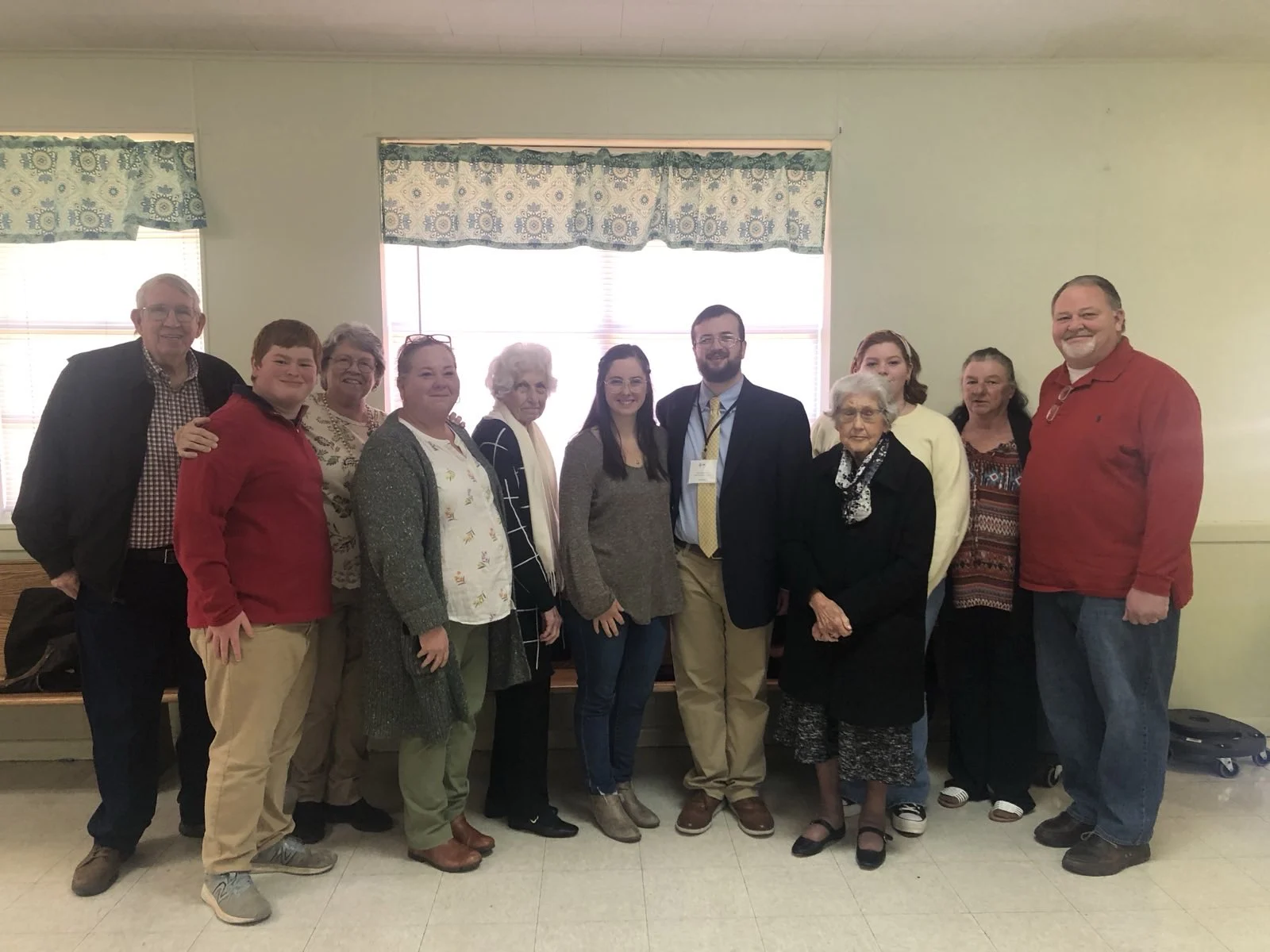
Last weekend, several of us attended the 32nd Stated Meeting of the Gulf South Presbytery at Grace Presbyterian Church in Alexandria, LA. The presbytery has a number of responsibilities. Some of them are mundane and administrative, but if you ever attend presbytery, you’ll notice that the bulk of our time is focused on supporting the ministry of the church, both at home and abroad. Here are some of the things you may be interested in:
-
We heard reports from our World Outreach Committee about ongoing work in Sierra Leone and the Middle East. The EPC is in fraternal relations with the Evangelical Presbyterian Church of Sierra Leone and has been engaged in mission work there for many years. The main thing we do is support Christian schooling in rural communities as an avenue for the gospel. So far, 6 churches have been established, 22 missions have been established, and the EPC of Sierra Leone has the goal of establishing 30 particular churches by 2030. If you would like to support this work, visit this webpage.
-
The EPC also has a small team that has been working in the Middle East for many years. They are connected to an evangelical church and school and focus particularly on reaching refugees from places like Syria. This is a very difficult place to work, and recently, our missionaries have been displaced by the Israel-Hamas war. In recent months, they have been furloughed in the United States, but now they are in the process of returning to the field. As a presbytery, we received one of the missionaries as a candidate under care. He is at the beginning of seminary, and our hope is that he will eventually be able to serve as a pastor in this region. You can support the work of this team at this link. (Since these missionaries are in a particularly dangerous place, they are only referred to as “G and E.”)
-
Most relevant to our congregation, the presbytery examined three men for examination, including me! We were all received unanimously in the presbytery. Eddie Ramer is a prison chaplain in the Louisiana prison system and serves at Grace Church in Alexandria. Jason Gregory is a navy chaplain who has recently been stationed on the Gulf Coast. He and his family attend Westminster in Gulfport. Both of these men will be endorsed as chaplains in the EPC. And of course, I was approved to serve as your pastor! This coming Sunday, a presbytery commission will be with us to officially ordain and install me.
Updates
-
Now that we have presbytery’s approval, we will have a service of ordination and installation this Sunday at 5PM. Members, especially, need to be present so that you can take your vows. And of course, we’ll have a celebration immediately following the service.
-
Next Sunday, February 9, our worship service will be followed by our Soup-erbowl lunch. Be sure to bring enough of your favorite soup for your family plus one. We would also encourage you to bring a special benevolence gift to support our missions partners.
Your friend in Christ,
Reid
Bulletin for January 26, 2025
Download Sunday’s BulletinThis weekend, I and several of your elders will be in Alexandria, LA, for the Gulf South Presbytery meeting. As we go, please pray for safe travels. Please also pray for me and the two other men who are going to be examined for ordination, Ed and Jason.
Then, this Sunday, Rev. Ro Taylor will be preaching for us. Ro is in the very earliest stages of planting a new church in Hattiesburg. So be sure to give him a warm welcome!
Finally, keep in mind that next Sunday, February 2nd, at 5 PM, we’ll be having an ordination and installation service. Then, the next Sunday, February 9th, we’ll have our Soup-erbowl Sunday lunch.
Your friend in Christ,
Reid
Bulletin for January 19, 2025
Download Sunday’s BulletinUpdates
-
Rev. Ro Taylor, our presbytery’s Hattiesburg church planter, will be preaching for us on January 26th.
-
A Service of Ordination & Installation for Reid Roberson is scheduled for February 2nd at 5 PM. We’ll have a reception with a meal afterward.
-
Soup-erbowl Sunday is February 9th. Bring enough of your favorite soup to feed your family plus one!
